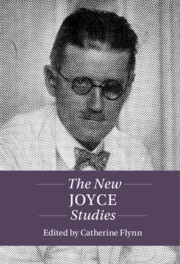Book contents
- The New Joyce Studies
- Twenty-First-Century Critical Revisions
- The New Joyce Studies
- Copyright page
- Contents
- Figures
- Notes on Contributors
- Acknowledgments
- Abbreviations
- Introduction
- Part I Scope
- Part II Fragment and Frame
- Part III Perspective
- Chapter 12 Joyce’s Nonhuman Ecologies
- Chapter 13 Joyce and the (Critical) Medical Humanities
- Chapter 14 The Epistemology of the Pantry A Queer Inventory of James Joyce’s “The Dead”
- Chapter 15 Revisiting the Early Reception of Finnegans Wake in 1939
- Chapter 16 Joyce and Critical Theory
- Bibliography
- Index
Chapter 16 - Joyce and Critical Theory
from Part III - Perspective
Published online by Cambridge University Press: 01 September 2022
- The New Joyce Studies
- Twenty-First-Century Critical Revisions
- The New Joyce Studies
- Copyright page
- Contents
- Figures
- Notes on Contributors
- Acknowledgments
- Abbreviations
- Introduction
- Part I Scope
- Part II Fragment and Frame
- Part III Perspective
- Chapter 12 Joyce’s Nonhuman Ecologies
- Chapter 13 Joyce and the (Critical) Medical Humanities
- Chapter 14 The Epistemology of the Pantry A Queer Inventory of James Joyce’s “The Dead”
- Chapter 15 Revisiting the Early Reception of Finnegans Wake in 1939
- Chapter 16 Joyce and Critical Theory
- Bibliography
- Index
Summary
Rabaté’s chapter traces the evolving interpretations of the revolutionary nature of Joyce’s writing. Beginning by retelling the reception of Joyce by Philippe Sollers, Jacques Lacan, and Jacques Derrida, and the turn towards historical and political readings, he argues for the theories of Jacques Rancière as allowing a synthesis of the two strands in the reception of Joyce’s work. Rabaté examines Joyce’s interest in the Italian theorist of history, Guglielmo Ferrero, tracing to Ferrero’s history Joyce’s interest in universal history, to his anti-Caesarism Joyce’s interest in the subversion of imperial figures, and to his theories of various migrant groups, and anti-Semitism specifically, Joyce’s conception of Leopold Bloom and his socialism. Rabaté moves from this notion of migration to Bakhtin’s theories of the carnivalesque and polyglossia to address the subversive humor of the Wake. Using the term “determinate negation” coined in The Dialectic of Enlightenment, by Adorno and Horkheimer, he argues that Joyce’s last work achieves a continuous dynamism through its use of principle of negation.
- Type
- Chapter
- Information
- The New Joyce Studies , pp. 252 - 267Publisher: Cambridge University PressPrint publication year: 2022

